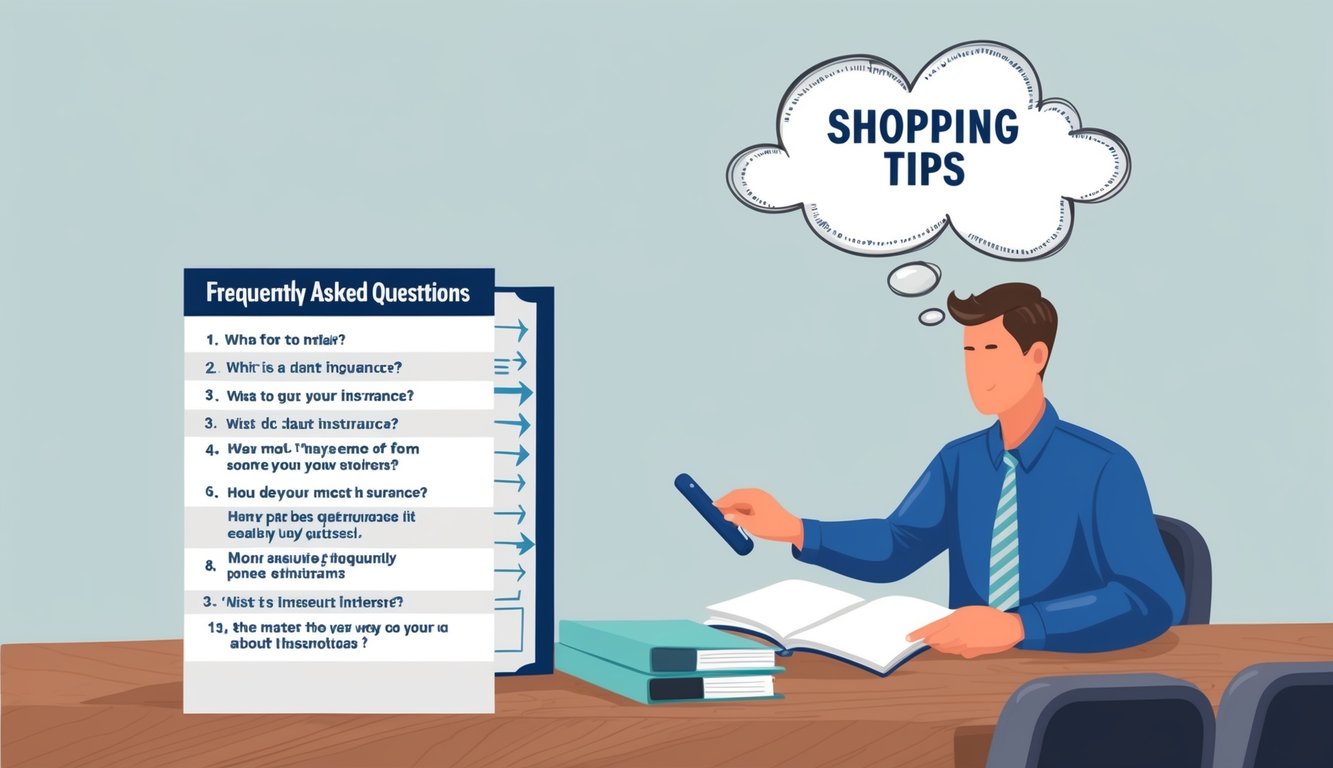Understanding Insurance Fundamentals
Understanding the basics of insurance is essential for making informed decisions about your car insurance coverage.
This knowledge can help you assess the best options to protect your vehicle and finances effectively.
Types of Car Insurance Coverage
Car insurance offers various types of coverage, each serving a distinct purpose.
The most common are:
- Liability Coverage: Most states require this. It covers damages you cause to others in an accident, including bodily injury and property damage.
- Collision Coverage: This pays for damage to your vehicle resulting from a collision, regardless of fault.
- Comprehensive Coverage: This covers non-collision-related incidents, such as theft, vandalism, or natural disasters.
- Uninsured Motorist Coverage: Protects you if you’re in an accident with a driver who lacks insurance.
- Personal Injury Protection (PIP): Covers medical expenses for you and your passengers, regardless of fault.
Understanding these coverage types ensures you meet legal requirements while adequately protecting your assets.
Decoding Insurance Policy Terms
Car insurance policies include specific terms that can be confusing without proper clarification.
Key terms you should know are:
- Premiums: The amount you pay for your insurance policy, usually billed monthly or annually.
- Deductible: The out-of-pocket amount you pay before your coverage kicks in. A higher deductible typically means lower premiums.
- Bodily Injury Liability: A component of liability insurance that pays for injuries you cause to others in an accident.
- Medical Payments Coverage: It covers medical costs for you and your passengers, regardless of fault.
Familiarizing yourself with these terms helps you understand your policy better and make informed choices.
The Role of Deductibles and Premiums
Deductibles and premiums play a crucial role in your insurance experience.
The premium is the regular payment you make to keep your policy active.
It varies based on factors such as your driving history and the coverage types you select.
The deductible is the amount you are responsible for paying before insurance coverage applies.
Choosing a higher deductible can lower your monthly premium, but be mindful of your financial ability to cover those costs in the event of a claim.
Assessing both your premium and deductible is vital for balancing affordable coverage with adequate protection.
Effective Insurance Shopping Strategies

Navigating the process of insurance shopping requires a deliberate approach.
To effectively secure the best rates and coverage, focus on maximizing discounts, comparing various providers, and utilizing online comparison tools.
Maximizing Discounts and Savings
When shopping for car insurance, it’s essential to explore all available discounts.
Many insurance companies offer various incentives that can significantly reduce your premiums.
Assess your eligibility for car insurance discounts such as safe driver discounts, multi-policy discounts, or even discounts for having an anti-theft device installed in your vehicle.
Consider improving your insurance history by maintaining a clean driving record.
Participating in defensive driving courses may also qualify you for additional savings.
Always ask insurance agents about lesser-known discounts and ensure your deductibles align with your financial situation.
In doing so, you can optimize your savings while maintaining necessary coverage.
Comparing Insurance Providers
To find the best policy for your needs, it’s crucial to compare insurance providers rigorously.
Look into both captive agents, who represent specific companies, and independent agents, who can offer a wider range of options.
Their insights will help you identify policies that suit your coverage needs without paying unnecessary premiums.
Request car insurance quotes from multiple providers and carefully review the coverage options each offers.
Pay close attention to the specifics such as limits of liability, comprehensive and collision coverages, and additional features.
This ensures you choose a policy that meets both your budget and protection requirements.
Utilizing Comparison Tools and Quotes
Employing online comparison tools can simplify the process of shopping for car insurance.
These platforms allow you to compare car insurance quotes side by side, enabling you to see the differences in rates and coverage levels clearly.
Fill out the required information accurately to obtain personalized quotes tailored to your insurance history and current needs.
Most comparison tools will also highlight potential discounts, helping you strategize your savings effectively.
Make sure to evaluate the reputation and customer service ratings of the companies you are considering.
This will provide peace of mind knowing you’re working with a reliable insurer.
Assessing Your Insurance Needs

Assessing your insurance needs is crucial for finding the right coverage.
This involves analyzing various aspects of your driving behavior, understanding vehicle-related factors, and evaluating your personal circumstances and risks.
Analyzing Driving History and Behavior
Your driving history and behavior significantly impact your insurance premiums.
Insurers review your driving record for incidents such as accidents, speeding tickets, and claims.
A clean driving record typically results in better rates as it indicates responsible driving.
You should keep track of your driving history and address any negative marks.
Many insurers offer incentives for improvements, such as completing defensive driving courses.
This can further reduce premiums while enhancing your driving skills.
Understanding Your Vehicle’s Insurance Impact
The type of vehicle you drive also influences your auto insurance policy.
High-performance cars or luxury vehicles often carry higher premiums due to increased repair costs and theft rates.
Conversely, vehicles known for safety and reliability can lead to lower rates.
Additionally, consider the coverage level needed for your specific vehicle.
Optional features, like comprehensive and collision coverage, may be beneficial depending on your situation.
Reassessing your vehicle’s value and insurance needs regularly is vital as market conditions change.
Evaluating Personal Factors and Risks
Your personal profile plays a critical role in determining insurance costs.
Factors such as age, occupation, and location can influence your risk assessment.
For example, younger drivers often pay higher premiums due to inexperience.
You should identify any personal risks that could affect your insurance needs.
Regional insurers might offer more competitive rates tailored to your location and driver demographics.
Regularly reviewing your risk factors helps ensure you maintain adequate protection while optimizing your coverage levels.
Selecting the Right Insurance Provider

Choosing the right insurance provider is crucial for finding coverage that suits your needs.
A thorough investigation of the insurer’s reputation and understanding the differences between agents can significantly impact your experience.
Investigating Insurer Reputation and Service
When selecting an insurer, begin by researching their reputation in the market.
Look for customer satisfaction ratings that reflect client experiences.
Websites like J.D. Power and Consumer Reports provide insights into customer service quality and reliability of various insurers.
Consider factors such as claims processing times and customer support availability.
You want a provider known for effective communication and assistance.
Check reviews to ensure the insurer is responsive to inquiries and claims.
Also, explore any affiliations with professional organizations.
Top-rated insurers often maintain memberships or accolades that indicate credibility.
Compile a list of potential insurers, paying close attention to those with strong reputations in auto insurance quotes and customer service.
Choosing Between Captive and Independent Agents
Deciding between captive and independent agents is vital in your insurance shopping process.
Captive agents represent a single insurer, limiting your choices.
While they offer specialized knowledge of their products, this may restrict your options for finding the best coverage.
Independent agents, on the other hand, work with multiple insurers.
They can provide a broader view of the market by comparing policies across various providers.
This flexibility allows them to help you find some of the best car insurance companies based on your specific needs.
Evaluate the experience of the agents and inquire about their communication style.
An independent agent may offer more tailored advice by interpreting various policy features across regional insurers and national providers.
Make sure to ask about their process for obtaining auto insurance quotes to gauge their efficiency and understanding of your requirements.
Finalizing Your Insurance Purchase

As you approach the end of your insurance shopping journey, it’s crucial to focus on reviewing your options thoroughly and making a well-informed decision.
Paying attention to the details in your quote and understanding the terms will set you up for success.
Reviewing and Understanding Your Quote
Start by carefully examining your insurance quote.
Look for key factors like premium costs, deductibles, and coverage limits.
This includes understanding what types of claims are covered and any exclusions that may apply.
Important elements to check:
- Premium Cost: Ensure it fits within your budget.
- Deductibles: Understand how much you will pay out of pocket in the event of a claim.
- Coverage Limits: Verify that the limits meet your needs, especially if you have a valuable vehicle.
Don’t hesitate to ask your insurer about any unclear terms.
It’s also wise to gather information about how your credit score may affect your rates.
Good credit can significantly lower your car insurance rates, so it’s essential to be aware of this factor.
Making an Informed Decision
Once you’ve reviewed your quotes, it’s essential to compare car insurance rates from various providers.
This helps ensure you’re getting the best deal for the coverage you need.
Consider taking a defensive driving course if it is offered.
Completing one can lead to discounts that help you save money on car insurance.
Be sure all of your personal information is accurate and up to date.
This includes:
- Your vehicle information.
- Your driving history.
- Roadside assistance needs.
With all this information, you can confidently choose the policy that best fits your lifestyle and budget.
Before finalizing your purchase, ensure that all details are correct, to prevent any issues when you need to file a claim.
Frequently Asked Questions

When navigating the landscape of car insurance, it’s essential to address common concerns that arise during the shopping process.
Understanding how to compare quotes, what factors to consider, and the advantages of exploring multiple options can enhance your decision-making.
How can I effectively compare different car insurance quotes?
To compare car insurance quotes effectively, start by gathering quotes from multiple insurers.
Ensure that you are comparing similar coverage types and limits.
Look beyond just the premium; consider deductibles, exclusions, and customer reviews for a well-rounded perspective.
What factors should be considered when choosing an insurance policy?
Several factors impact your choice of insurance policy.
Key considerations include coverage types (liability, collision, and comprehensive), the deductible amount, premium costs, and any discounts that may apply.
Your driving history and the type of vehicle you own also significantly influence your options.
What are the benefits of shopping around for car insurance?
Shopping around for car insurance can lead to significant savings.
Different insurers offer varying rates based on their own underwriting criteria.
By comparing multiple quotes, you can identify the best coverage at the lowest cost, ensuring you get value for your money.
Does obtaining multiple insurance quotes affect my credit score?
Generally, obtaining multiple insurance quotes does not impact your credit score significantly.
Insurers typically conduct a soft inquiry for quotes, which does not affect your credit as hard inquiries do.
This allows you to compare rates without worrying about damaging your credit profile.
What is the best time of year to purchase car insurance?
There isn’t a universally best time to purchase car insurance, but some experts suggest shopping around during the spring or fall.
Insurers may offer various promotions at these times, and reviewing your policy annually aligns with common renewal cycles.
What are the key indicators of a reputable and reliable insurance company?
To identify a reputable insurance company, look for strong financial stability ratings from agencies like A.M. Best or Moody’s. Customer service ratings, claims processes, and customer feedback are also critical indicators of reliability.
A transparent claims process and clear communication can enhance your confidence in a provider.






